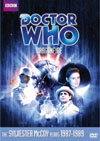DVD Extras include:
The Doctor and Melanie then get a good TARDIS interior scene properly introducing the story's setting, and it's a particularly imaginative one this time. We probably haven't had as much thought being given to a planet's orbital conditions since Solos in "The Mutants" (story no. 63). Svartos here is very cool. Both the planet and the various vehicles in the story, TARDIS included, continue to get good coverage where appropriate, including extra establishing shots and materializations. In fact (and perhaps due to a few rewrites happening at the last minute), the TARDIS interior is better represented here than anywhere else in the Sylvester McCoy era. Most of the remaining characters receive good introductions as well, and thankfully they are for the most part all understandably normal today, making it easy for the audience to believe in them, appreciate them, and invest in them emotionally. Producer John Nathan-Turner makes one of his best moves of the season in deciding that Briggs' mercenary-pirate character be slightly rewritten as Glitz, which allows Tony Selby to make a return appearance as the fan-favourite character. Glitz is a joy to have in the story, boosting its popularity and enjoyment factor quite nicely. But perhaps even more memorable is the fact that this is the tale to introduce soon-to-be companion Ace, easily one of the most highly rated companions ever. I suspect the freedom Briggs had in creating the character when they thought she would only appear in this one story, coupled with his exposure to teenagers at the time, all helped give her the extra traits that made her work well as a character, and one particularly well-suited to this show. Sophie Aldred also brings a lot of good energy and enthusiasm to the part, which gets a nice share of the story's focus and a good variety of different moods throughout. Although the camera seems keen to keep her a bit of a secret at first, while the Doctor, Melanie, and the audience take a moment to absorb Glitz's presence in the story, it isn't long before she pops out and makes her mark. Unlike Mike Yates in "Terror of the Autons" (story no. 55) or "Invasion of the Dinosaurs" (story no. 71), she doesn't have to wait until the tale's second episode to get her due.
"Oh, Cor! Can I come too, Professor?"The narrative quickly gels around a great plot backbone, namely the search for a special treasure, triggered by a map. The Doctor's in it for the exploration and possible scientific discovery, Ace for the adventure, Glitz for the promised financial gain. And Melanie....? This poor character still seems a bit lost in terms of any ability to define herself, stemming from the fact that she never really got a chance at a proper introductory story for herself. At best, she seems to be a support person, helping out both the Doctor and Ace here in different ways. In fact, in many ways, Melanie appears to find herself somewhat in this story better than in any of her others.... By contrasting her with Ace, her maturity begins to show in a few scenes, and it does her character good.
The "Adventurers' Debts" ThemeThere is nice thematic content to the character arcs of the story, and unlike "Delta and the Bannermen" (story no. 150), this story does not throw away its best threads. The common pattern here is that fast, easy choices for adventure and profit are later regretted when the long-term costs are realized and added up. Although Glitz plays into this on levels of pure financial gamble, the pattern shows up best in the parallels between three of the women in the story.Belazs is the most obvious of the three. As the eldest of them, she is able to look back at the whole arc and comment on it, and turns out to be one of the strongest and most interesting characters in the piece, articulating the story's theme for the audience and having many really nice scenes playing all kinds of different emotions and facets of the problem. Patricia Quinn delivers a strong performance, working well off of any member of the cast that she gets to work with. There is much more to be said about these parallels, but perhaps it's best to save that for the in-depth analysis version of this review, to avoid spoilers. A lot of fans and viewers may well wonder why so much screen time in part three is devoted to a small girl named Stellar. As it stands, I don't think the director and his crew quite found time to wrap their heads around Stellar's possible reasons for being in the story and keep that front and center during her appearances. This is an area that could have lifted Dragonfire's artistic prestige had they got it a little more correct. Kane's own character arc also proves interesting. Edward Peel plays the part very well, realizing what is easily the best villain of the season.
Dragon QuestThe Doctor's investigations of the mysteries in the tale work quite well, and take us to some good places that are both culturally and visually interesting. What we get is quite cool and a lot of fun - possibly the best cultural history tidbits we've had since "Snakedance" (story no. 125), "Planet of Fire" (story no. 135), or "Frontios" (story no. 133). But there is a bit of a caveat, which I won't reveal here.The cliffhangers in "Dragonfire" are not great, and the success of the story's main creature is a bit limited. In some moments, it seems capable of being as frightening as the title creature in Ridley Scott's 1979 film "Alien", but without more careful blocking, lighting, and editing, such moments are few and far between, and rarely sustained for an entire shot. Thankfully, the story is not too dependent on such fears in order to work, and the creature remains successful for other reasons.... The music for this story marks a refreshing return to a style better suited for integrating with audio-visual storytelling, as composer Dominic Glynn returns to break the monopoly that Keff McCulloch somewhat inadvertently ended up with. Glynn scores the story appropriately, while mixing in thematic material where it will best serve the story's undercurrents. His theme backing the Belazs parallels is very moving and one of his best pieces for the show, while the return of his theme for Glitz is yet another nice touch. Good stuff all around. The final episode has a bit of trouble maintaining its focus as well as previous episodes, but doesn't do too badly. On the whole, it does a good job of upping the ante and giving us more exciting visuals than we've had previously. Special effects are not bad in this one, and it has quite a variety. Model work is plentiful, and if it is having the same problem of lack of stars behind the trajectory of anything moving in space, which we had in the other stories this season, it is disguising it so well that it is not noticeable.
Season 24 Rankings:
This story is available on DVD and VHS video. Click on the Amazon symbol for the location nearest you for pricing and availability:
Comments on this article are welcome. You may contact the author from this page:
|








